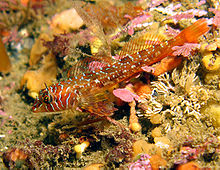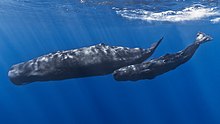
Back حيوان مائي Arabic Animal aquàtic Catalan Akva animalo Esperanto Animales acuáticos Spanish Veeloomad Estonian آبزیان Persian Animal aquatique French Hewan akuatik ID 生活型 (水生生物) Japanese ٲبی جانور Kashmiri


An aquatic animal is any animal, whether vertebrate or invertebrate, that lives in a body of water for all or most of its lifetime.[1] Aquatic animals generally conduct gas exchange in water by extracting dissolved oxygen via specialised respiratory organs called gills, through the skin or across enteral mucosae, although some are evolved from terrestrial ancestors that re-adapted to aquatic environments (e.g. marine reptiles and marine mammals), in which case they actually use lungs to breathe air and are essentially holding their breath when living in water. Some species of gastropod mollusc, such as the eastern emerald sea slug, are even capable of kleptoplastic photosynthesis via endosymbiosis with ingested yellow-green algae.
Almost all aquatic animals reproduce in water, either oviparously or viviparously, and many species routinely migrate between different water bodies during their life cycle. Some animals have fully aquatic life stages (typically as eggs and larvae), while as adults they become terrestrial or semi-aquatic after undergoing metamorphosis. Such examples include amphibians such as frogs, many flying insects such as mosquitoes, mayflies, dragonflies, damselflies and caddisflies, as well as some species of cephalopod molluscs such as the algae octopus (whose larvae are completely planktonic, but adults are highly terrestrial).
Aquatic animals are a diverse polyphyletic group based purely on the natural environments they inhabit, and many morphological and behavioral similarities among them are the result of convergent evolution. They are distinct from terrestrial and semi-aquatic animals, who can survive away from water bodies, while aquatic animals often die of dehydration or hypoxia after prolonged removal out of water due to either gill failure or compressive asphyxia by their own body weight (as in the case of whale beaching). Along with aquatic plants, algae and microbes, aquatic animals form the food webs of various marine, brackish and freshwater aquatic ecosystems.
- ^ Biology Online Dictionary: "Aquatic" Archived 31 May 2009 at the Wayback Machine